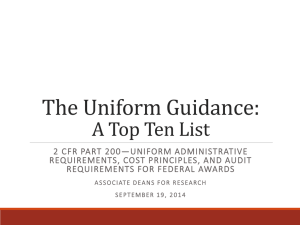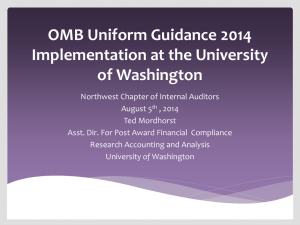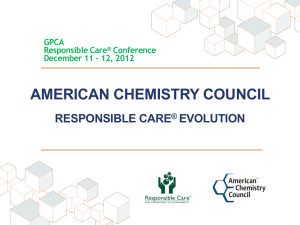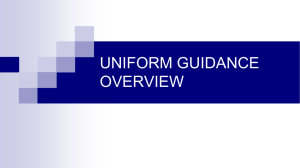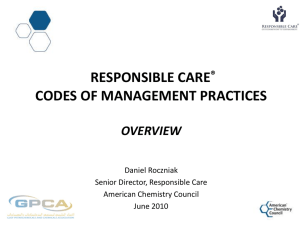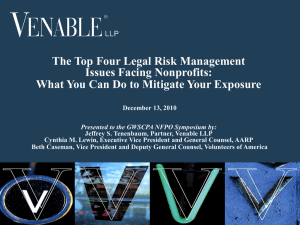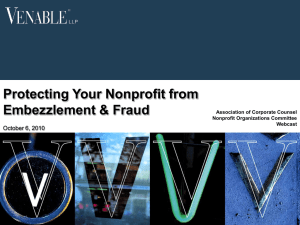Fundamentals of Federal Grants Compliance
advertisement
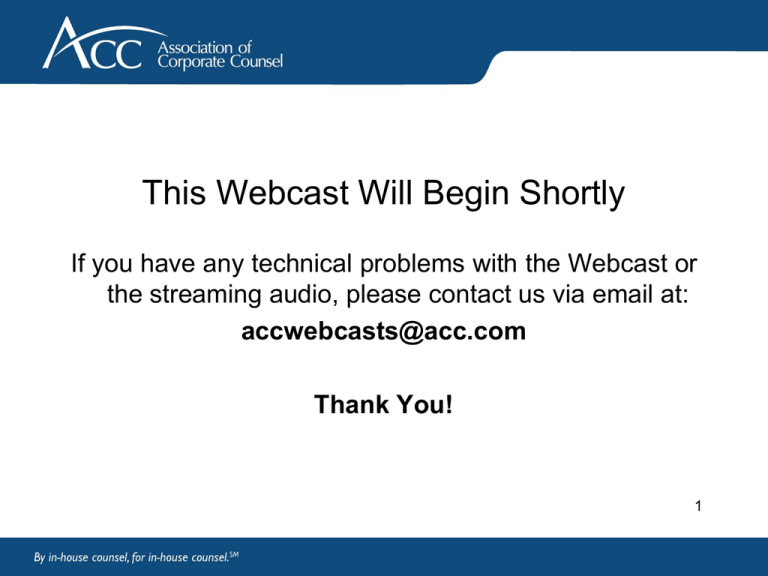
This Webcast Will Begin Shortly If you have any technical problems with the Webcast or the streaming audio, please contact us via email at: accwebcasts@acc.com Thank You! 1 Goldmines and Landmines – Fundamentals of Federal Grants Compliance May 12, 2010 Presented By: Jeffrey Tenenbaum Terry Elling Rebecca Pearson Venable LLP www.venable.com 2 Today’s Objectives • Discuss key statutory and regulatory compliance requirements for Federal Grant recipients and subrecipients • Identify principal noncompliance risks and strategies for mitigating risk of noncompliance • Opportunity to ask questions! 3 Federal Grant Compliance – Key Points • By accepting a federal grant (or subgrant), the recipient agrees to comply with the applicable Federal requirements and to the prudent management of all expenditure and actions affecting the award. • Every submission (e.g., Grant application, performance and financial reports, periodic certifications) is a statement to a government official • Every request for payment is viewed as a certification that the awardee is complying with all material requirements and terms • Only Actual Authority will normally bind the government – beware of “guidance” from unauthorized government representatives 4 Government Grants – Sources of Compliance Requirements • OMB Cir. A-110 (2 CFR Part 215), Uniform Administrative Requirements for Grants and Agreements • OMB Cir. A-122 (2 CFR Part 230), Cost Principles for Non-Profit Organizations (Note that different, but similar, Cost Principles Apply to Educational Institutions, and State and Local Governments) • OMB Cir. A-133, Audits of States, Local Governments, and Nonprofit Organizations • Statutes and Regulations that Establish Specific Grant Programs (e.g, American Reinvestment and Recovery Act) • Agency-specific Grants regulations and policies 5 OMB Cir. A-110 and Common Agency Requirements • Reporting Requirements – Project Performance – Financial • Grantee Code of Conduct • Procurement Standards – Competition – Conflict of Interest Policy – Cost and Price Reasonableness – Contract Administration and Documentation • Equal Employment Opportunity and Other Labor and Employment Standards Requirements 6 OMB Cir. A-110 and Common Agency Requirements (Cont.) • Effective control over and accountability for all funds, property, and other assets • Comparison of outlays with budget amounts for each award • Written procedures to minimize the time elapsing between the transfer of funds to the recipient • Written procedures for determining the reasonableness, allocability, and allowability of costs • Accounting for and use of Program Income • Accounting records with supporting documentation 7 OMB Cir. A-122 – Cost Principles • Costs expended with grant funds must be: – Reasonable in amount; – Allocable to the purpose or object of the grant program; and, – Allowable under government cost principles • Grant application budgets and financial reports are scrutinized for compliance with cost principles • Compliance with Cost Principles is primary area of interest in audits 8 OMB Cir. A-122 – Cost Principles Areas of Concern • Indirect Costs (aka “Facilities and Administrative Costs”) • Fee (Profit) • Direct Costs (Examples) • • • • • • Personnel Compensation Advertising and Public Relations Fundraising and Investment Management Professional Services Travel Alcoholic Beverages 9 OMB Circular A-133 The Single Audit Act • Applicable to any grant recipient or subrecipient that expends more than $500,000 in federal awards • When available, program-specific audits provide audit guidance, which must be complied with. • Non-program-specific audits shall include, at a minimum: – A schedule of expenditures of Federal awards for the program; – Notes that describe the significant accounting policies used in preparing the schedule; – A summary schedule of prior audit findings; and 10 – A corrective action plan. Grant Compliance – Approval Requirements • Most Agencies require that Grant Recipients obtain prior written approval prior to making significant project changes, such as: – Transfer of the project effort – Change in objective or scope – Change in the amount or proportion of cost sharing reflected the grant award budget – Absence or change of Principal Investigator or other Key Personnel – Rearrangement/alterations from budget aggregating $25,000 or more 11 Consequences of Noncompliance • Special oversight/review status • Administrative sanctions – Reduction in payments – Termination of Grant • Suspension/debarment/exclusion • Corrective action plans • Mandatory compliance plans • Criminal and Civil Penalties – False Statements – Criminal and Civil False Claims 12 Grant Compliance – Most Common Offenses (National Science Foundation Study) • • • • • • Theft/Embezzlement (31%) False or Fraudulent Statements (24%) Miscellaneous/Other* (20%) False or Fraudulent Claims (13%) Conflicts of Interest (9%) Computer Fraud (3%) * Includes mail fraud, false identification insurance fraud, impersonating a Government officer, and copyright infringement. 13 Grant Compliance - Most frequent adverse audit findings (National Science Foundation Study): – Policies and procedures inadequate or absent: 24% – Lack of source documentation to support costs: 18% – Inadequate system to track, manage, or account for costs and/or assets: 14% – Unallowable costs: 7% – Lack of proper approval, certification, or authorization: 6% – Lack of subrecipient monitoring: 6% – Inadequate or absent project or technical report: 6% – Reconciliations inadequate or not performed: 4% – Inadequate or absent financial report or proposal: 4% – Costs claimed exceed amounts or rates allowed by award provisions or Federal regulations: 4% – Lack of segregation of duties: 4% 14 Common Sources of Compliance Problems • Overly ambitious objectives in grant application • Failing to ensure that subrecipient and subcontractor agreements “flow-down” all required terms • Failing to ensure that required reports are accurate and submitted on time • Failing to obtain required Agency approvals of changes in grant program • Failing to timely report problems affecting program or financial performance 15 Grant Compliance – Risk Areas • • • • • • • • Adequate program documentation Travel documentation Cost-sharing Records retention Separate financial administration for each award Violations of institutional conflict of interest rules Sub-awardee monitoring Residual funds – accounting and disposition 16 Grant Compliance – Strategies • Organizational Policies and Procedures – Accounting/Purchasing/Code of Conduct policies tailored to Grant requirements and Organization – Training for Key Managers and Grant Management Personnel – Grant Closeout and Records Retention • Subawards and Subcontracts – Flow-down required and desired Requirements – Actively manage and monitor performance • Regular Review of Above Items 17 • Questions? • Comments? • Thank you! 18 Contact Information • Jeff Tenenbaum – jstenenbaum@venable.com – (202) 344-8138 • Terry Elling – tlelling@venable.com – (202) 344-8251 • Rebecca Pearson – repearson@venable.com – (202) 344-8183 19 Thank you for attending another presentation from ACC’s Desktop Learning Webcasts Please be sure to complete the evaluation form for this program as your comments and ideas are helpful in planning future programs. If you have questions about this or future webcasts, please contact ACC at accwebcasts@acc.com This and other ACC webcasts have been recorded and are available, for one year after the presentation date, as archived webcasts at http://webcasts.acc.com. You can also find transcripts of these programs in ACC’s Virtual Library at http://www.acc.com/search/cfm 20


